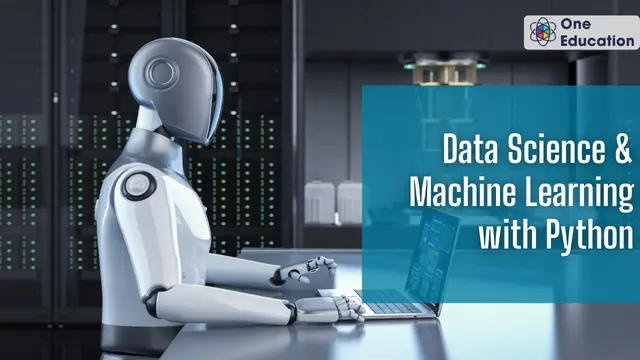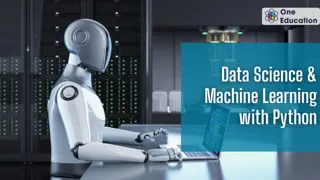
Data Science & Machine Learning with Python
One Education
Learn Data Science & Machine Learning with Python | Free Certificate | Lifetime Access | Easy Refund
Summary
- Reed Courses Certificate of Completion - Free
- Tutor is available to students
Add to basket or enquire
Overview
Certificates
Reed Courses Certificate of Completion
Digital certificate - Included
Will be downloadable when all lectures have been completed.
CPD
Curriculum
Course media
Description
This Data Science & Machine Learning with Python course is designed for beginners and intermediate learners who want to dive into the world of data science. Through this course, you will gain a solid understanding of Python programming, data manipulation techniques, and the basics of machine learning. Learn how to use libraries like NumPy, Pandas, and Matplotlib, and apply machine learning algorithms to solve real-world problems.
With a hands-on approach, you will work with actual datasets, build predictive models, and understand the intricacies of data processing and evaluation. By the end of the course, you’ll be prepared to take on data science projects with confidence, setting you up for a career in one of the UK’s fastest-growing sectors.
Learning Objectives:
- Master the basics of Python programming and key data manipulation libraries (NumPy, Pandas, Matplotlib).
- Understand the core concepts of machine learning and classification algorithms.
- Learn how to prepare, clean, and preprocess data for machine learning models.
- Gain experience in model evaluation using various metrics and techniques.
- Develop hands-on expertise in building, training, and optimizing machine learning models.
Why Should You Take This Course?
Data Science and Machine Learning are among the most sought-after skills today. By taking this course, you’ll gain practical knowledge that is directly applicable to real-world challenges, making you highly employable in the tech and business sectors. This is a great opportunity for those looking to enter or advance in the field, with significant earning potential and job opportunities across industries such as finance, healthcare, and technology.
Who is this course for?
- Aspiring data scientists
- Python programmers wanting to specialise in data science
- Professionals looking to upskill in machine learning
- Anyone passionate about solving problems with data
Requirements
- No experience required
- A computer with an internet connection
- Willingness to learn and apply new data science techniques
Career path
- Data Scientist: £40k to £70k
- Machine Learning Engineer: £45k to £80k
- Data Analyst: £30k to £50k
- Business Intelligence Developer: £35k to £60k
Questions and answers
Currently there are no Q&As for this course. Be the first to ask a question.
Reviews
Currently there are no reviews for this course. Be the first to leave a review.
Legal information
This course is advertised on Reed.co.uk by the Course Provider, whose terms and conditions apply. Purchases are made directly from the Course Provider, and as such, content and materials are supplied by the Course Provider directly. Reed is acting as agent and not reseller in relation to this course. Reed's only responsibility is to facilitate your payment for the course. It is your responsibility to review and agree to the Course Provider's terms and conditions and satisfy yourself as to the suitability of the course you intend to purchase. Reed will not have any responsibility for the content of the course and/or associated materials.


